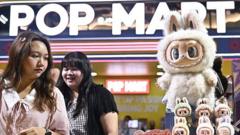Pop Mart, the Chinese toy company renowned for its Labubu dolls, is on track for a profit surge of at least 350% for the first half of this year, spurred by a notable tripling of revenues. The Beijing-based company, valued at over $40 billion, attributes this financial windfall to heightened global brand awareness and effective cost management.
The Labubu dolls, characterized by their quirky, elf-like appearance and jagged teeth, have become a global sensation, leading to rampant consumer demand and long lines at retail locations. Pop Mart's business model predominantly revolves around "blind box" sales—sealed packaging that conceals collectibles until opened—sparking debate over its potential to encourage compulsive purchasing behaviors.
Since their initial release in 2019, Labubu dolls have played a pivotal role in shaping Pop Mart's rise as a formidable retail entity, with operations spanning more than 2,000 vending machines and storefronts globally. The company's listing on the Hong Kong Stock Exchange in 2020 marked the beginning of an extraordinary growth trajectory, with a 600% valuation increase over the past year.
Notably, international sales, particularly from markets outside mainland China, now account for nearly 40% of Pop Mart's total revenue. The unprecedented demand for Labubu dolls has at times overwhelmed retailers, forcing many to temporarily halt sales. The dolls' popularity in the United States has been markedly enhanced by celebrity endorsements from figures such as Kim Kardashian and Lisa of K-pop fame.
According to equity research firm M Science, Labubu sales in the US soared by an astonishing 5,000% from the previous year. Analyst Vinci Zhang highlighted the company's untapped potential in the US, where it operates approximately 40 locations, in stark contrast to close to 400 in China.
Accompanying this buying frenzy is a burgeoning resale market, where dolls initially priced around $10 can fetch staggering sums—one human-sized Labubu reportedly sold for $150,000 at a Beijing auction in June. However, the craze has also given rise to counterfeit products, leading Chinese authorities to seize over 46,000 fake Labubu dolls in recent months as part of efforts to dismantle the thriving black market.
The Labubu phenomenon raises questions about the sustainability of current marketing strategies in the toy industry and highlights the balance between consumer excitement and the risks of compulsive buying.






















